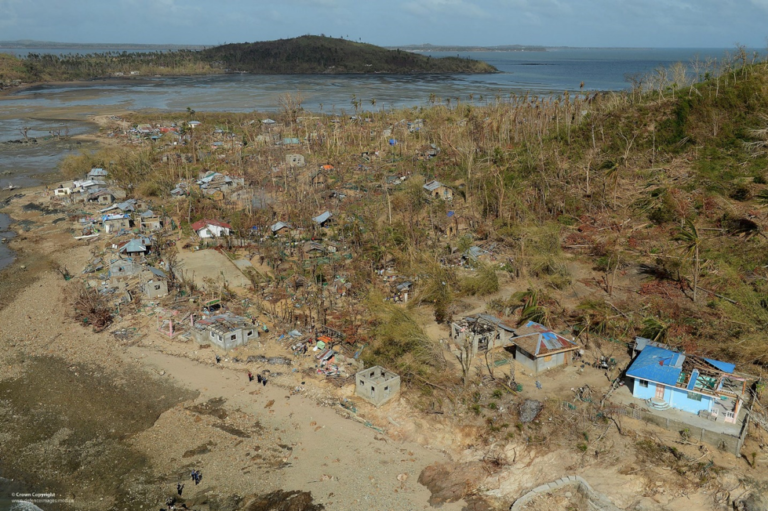
Philippine island of Binuluanguan following typhoon Haiyan, one of the most powerful tropical cy-clones ever recorded. Credits: Defence Images, CC BY-NC 2.0.
The challenge of putting climate justice at the forefront of SENTRO’s agenda
After many years of trial and error, one of the Philippines’ biggest trade union confederations, SENTRO (Sentro ng mga Nagkakaisa at Progresibong Mangagawa – Centre for United and Progressive Workers), has found a way to mobilize its workers for climate justice issues by linking their day-to-day struggles with the accelerating climate crisis.
The Philippines is one of the countries most affected by climate change. Yet despite the devastating consequences the country faces, prioritizing climate change issues has been challenging as unions are preoccupied with fighting for worker’s rights in an environment where the government resists collective bargaining and the assertion of workers’ rights. SENTRO struggled to mobilize its members for climate issues by educating them about climate change. In recent years, the union has discovered it is more effective to directly link worker’s issues, such as improved working conditions and fair wages, to climate issues.
The three areas where SENTRO has been particularly successful in linking these issues concern the workers in energy cooperatives in danger of privatization, jeepney drivers who are threatened with the wholesale loss of their livelihood, and informal settler families who are asserting their right to live in cities.
Electric cooperatives fighting privatization
In 1969, the central government of the Philippines created the National Electrification Administration (NEA), which kick-started the country’s rural electrification programme, with the goal to achieve 100 per cent electrification in the Philippines. To achieve this goal, the NEA set up electric cooperatives, which became widespread throughout the country. Today, the Philippine Rural Electric Cooperatives Association has 119 member cooperatives, which provide electricity to rural areas. However, when a large privatization wave hit the power industry in the early 2000s, electric cooperatives were included in the privatization agenda. As many of the workers from the energy cooperatives are members of SENTRO, the union set out to mobilize its members in a campaign against the privatization of energy cooperatives.
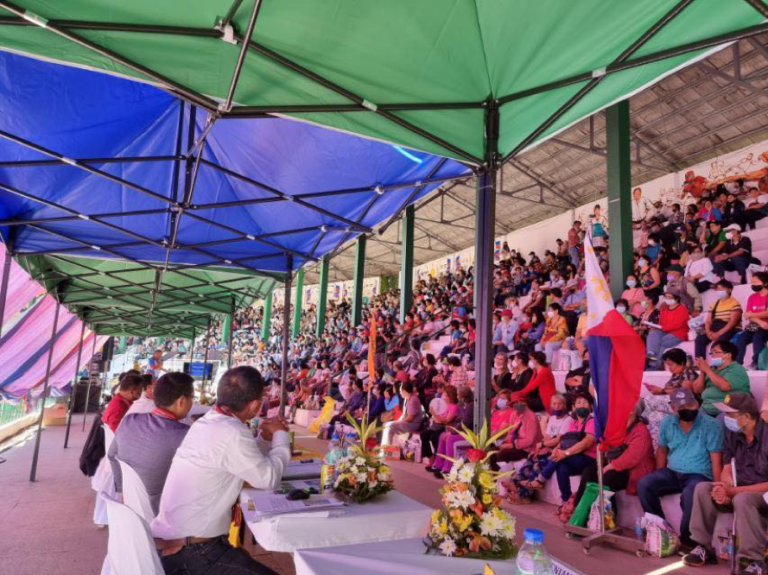
Member-consumer-owners in Benguet Electric Cooperative during BENECO’s 41st Annual Regular General Assembly Meeting. Credits: Philippine Rural Electric Cooperatives Association via Facebook
Users joining the electricity worker’s strike
Starting in 2003, SENTRO began to actively organize against the privatization of electric cooperatives. As well as organizing the workers in the cooperatives, the campaign also gathered support from the cooperatives’ user members, by educating, organizing, and politicizing them about the issues at stake. The campaign highlighted that instead of privatizing electric cooperatives, substantial benefits for both users and workers can be reaped from dialogue and support between the cooperatives.
Ten years later, the support for SENTRO’s anti-privatization campaign was tested when the government of the Albay province took steps to sell the Albay Electric Cooperative (ALECO) to the private San Miguel Energy Corporation. The energy cooperative workers went on strike and called on user members to boycott the private corporation and support the worker’s strike by not paying their electricity bills. Support for the boycott was substantial among users, prompting the private corporation to cut off electricity for households that joined the boycott. Cooperative workers then reconnected these households to guarantee access.
The fight against the privatization of ALECO lasted for three years but was lost when user members were bribed to favour privatization in a referendum. Ultimately, this led to the privatization of the cooperative, yet due to a continuous backlash from workers and users, the San Miguel Energy Corporation struggles to reap profits from the privatization. Despite losing the campaign in Albay, SENTRO gained major political ground over the three years of strikes, as the collective action demonstrated that electric cooperative workers can and will fight back against privatization.
Since then, private corporations have repeatedly tried to persuade corrupt politicians to pass legislation in favour of privatizing other electric cooperatives. Efforts by workers and users have so far prevented local politicians from easing the restrictions to prematurely end franchise contracts with electric cooperatives and allow their takeover by private corporations, but the fight to ensure electric cooperatives remain in public hands remains a core challenge.
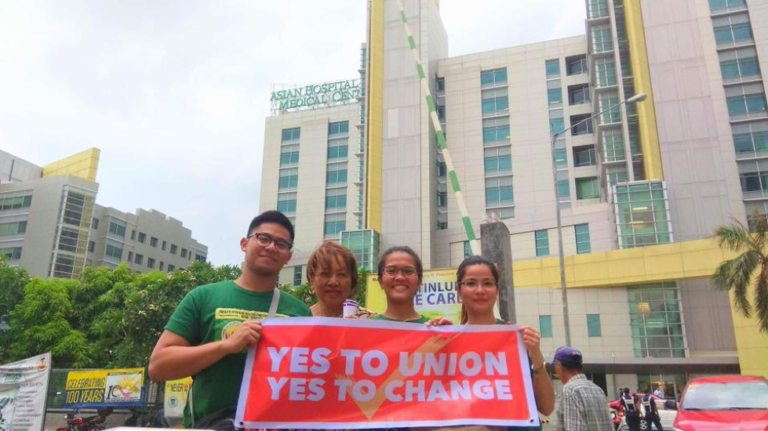
Credits: SENTRO via Facebook
Gaining independence from private energy
Defending electric cooperatives from privatization and at the same time pushing for renewable energy sources has become an important task for SENTRO, particularly for its affiliate in the power sector, the National Union of Workers in the Power Industry (POWER). The union now stands at the forefront of fighting for energy democracy in the Philippines. Yet a major task to achieve a just energy transition within the electric cooperatives still lies ahead.
Under the current system, electric cooperatives purchase energy from private corporations, of which a substantial share stems from fossil fuels, and resell it to the rural communities they operate in. By generating energy themselves, using renewable sources such as solar or hydropower, electric cooperatives could not only gain independence from private energy producers but also decrease the cost of electricity by as much as 12.5 per cent of current prices. A major challenge in this process lies in the fight for public funding. Without state support, cooperatives lack the funds to set up production sites for renewable energy. The fight to secure public funding for a just energy transition in the Philippines’ rural energy sector remains a core issue of SENTRO’s campaign.
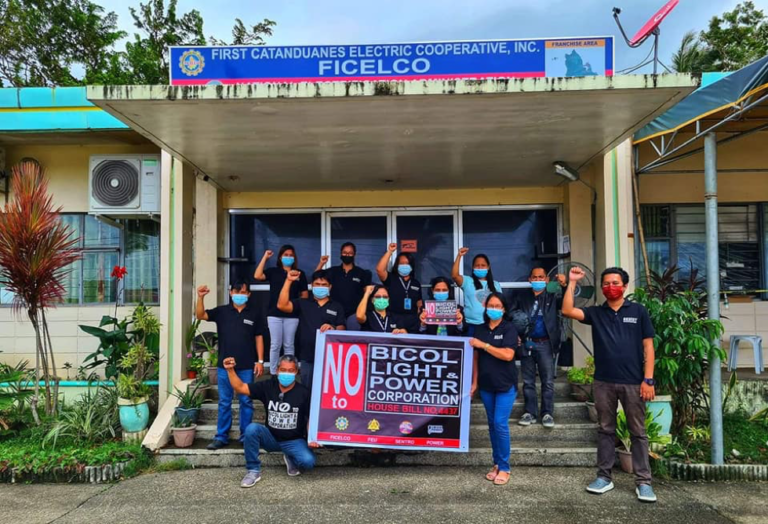
Power-Sentro and the rest of electric cooperatives opposing the application for franchise of bicol lights and power corporation. Credits: National Union of Workers in the Power Industry- Power-Sentro via Facebook
No clean public transit without justice for drivers
SENTRO is also fighting for a just energy transition in the public transportation sector, linking jeepney drivers’ struggle for better working conditions with the need for government assistance in the transition to cleaner vehicle engines.
When the central government of the Philippines decided to phase out the country’s traditional jeepneys (minibus-like vehicles which are an important means of public transportation), jeepney workers realized that their struggle to maintain their operations was directly linked to the fight for a just transition.
Traditional jeepneys are the cheapest form of transport in the Philippines, yet due to their diesel engines, they are a major cause of poor air quality in urban centres. Studies estimate that the jeepney sector alone accounts for 15 per cent of the Philippines’ road transport-related greenhouse gas emissions, while motor vehicles are among the country’s largest sources of air pollution. In 2017, the government passed legislation to phase out diesel-engine jeepneys and mandate drivers to use electric vehicles instead. The PUV (Public Utility Vehicle) modernization programme ordered the replacement of roughly 180,000 jeepneys that had been in use for at least 15 years, yet it lacked support mechanisms to help drivers replace their vehicles.
This lack of support sparked nationwide strikes and protests among jeepney workers, who labelled the PUV modernization programme ‘anti-poor’ and demanded financial assistance for a just transition. ‘No modernization without a just transition’ became the leading slogan of the campaign of the National Confederation of Transport Workers’ Unions (NCTU), an affiliate of SENTRO. After a nationwide transport strike paralyzed key cities in 2017, the authorities agreed to a three-year grace period that would allow jeepney drivers to transition to electric vehicles or vehicles with cleaner engines.
Jeepney drivers realized the power of standing together, and many who were previously part of the informal economy organized themselves into transport cooperatives. Through their cooperatives, members started acquiring modernized jeepneys, some of them electric, using partial government subsidies. However, a comprehensive financial support package targeting vulnerable and informally employed jeepney drivers is still missing.
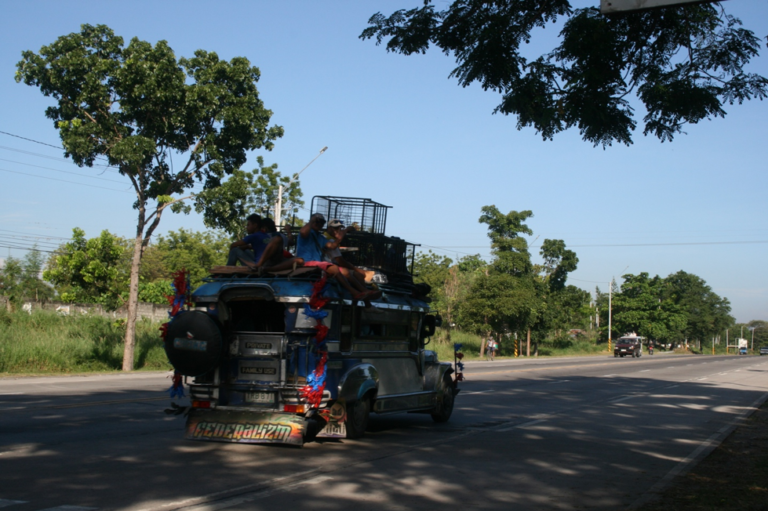
Philippine Jeepney. Credits: Gary Todd, public domain, Flicker
Improving precarious working conditions
The COVID-19 pandemic posed another significant challenge for the jeepney drivers. Many were forced out of work due to the country’s strict lockdown, leaving numerous families without an income for months on end. Even after the end of the strict lockdowns, jeepney drivers were unable to recover from the shock as public health guidelines mandated them to operate at reduced capacity. These restrictions meant that drivers’ earnings significantly declined, causing them to work longer hours to feed their families and pay vehicle rents.
Out of these struggles, SENTRO, together with public transportation activists, developed the idea of service contracting. This means that the government would hire jeepneys and other public transportation vehicles to provide commuters with safe and efficient transport services, collecting fares directly from the passengers, while providing drivers guaranteed income based on their working hours. This replaces the current ‘boundary system’, in which jeepney drivers pay a fixed amount of rent per day to jeepney owners, which forces them to work long hours to earn enough to pay for rent, fuel, and maintenance costs. All previous attempts to change the system over the past several decades have failed.
While service contracting has led to more stable incomes and improved working conditions for some jeepney drivers, its implementation in many areas is being bungled by the government. Currently, SENTRO and the NCTU are putting forward proposals for institutionalizing service contracting, however dialogue with the national government is highly challenging, slowing progress on this important dimension of the just transition process.
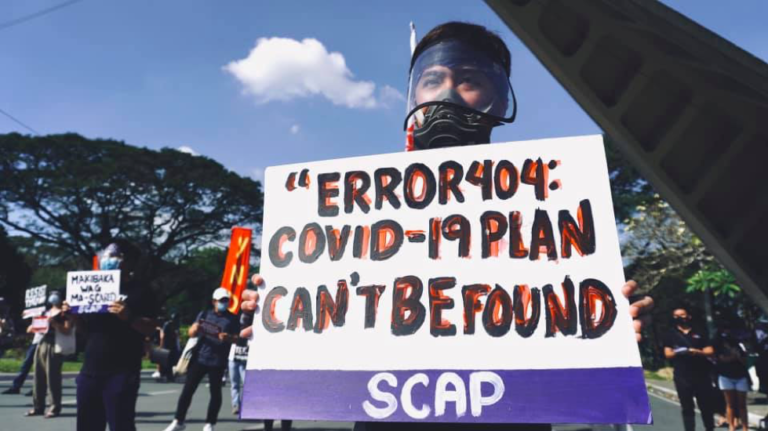
Solarized homes for the urban poor
Tropical storms and flooding are becoming more frequent and intense in the Philippines, and as a consequence, already marginalized communities in urban centres are especially at risk of losing their homes and livelihoods due to flooding. In connecting their struggles for new public homes in safe places to the climate crisis, community-based unions have turned the fight for new homes into a fight for climate-friendly new homes, equipped with solar panels. Communities of informal settler families that are being relocated to new public housing are demanding that their new homes have solar panels, allowing them to reduce electricity costs and increase their energy independence. However, due to the high costs involved in solarizing homes, local government units are hesitant to support the unions’ demands, which limits the success of the campaign substantially. Securing local government support and funds for solarized public housing is a major challenge.
Current challenges and next steps
SENTRO has found a way to incorporate climate issues into the union’s agenda – by creating direct links between climate justice, workers’ rights, and a public energy transition.
While the union has advanced in three key areas – electric cooperatives, jeepney drivers and community-based unions – the challenge remains to apply this approach to other campaigns and institutionalize the idea that there cannot be modernization without democratic public policies to ensure that climate and energy justice is served. A crucial next step to achieve this is to create a law that obliges the transition to renewable energies in all sectors to be just, democratic, and equitable. This would enable the Philippines to move towards a clean and fully public energy system that prioritizes the decent work needed to power peoples’ homes and public transport, over private profit.
An important aspect is to secure sufficient government funding for ongoing just transition projects, such as for electric cooperatives to produce renewable energy, for jeepney drivers to transition to electric vehicles, and for solarized public housing. Campaigns must find a way to link the core issue of worker’s rights with climate justice issues in order to work towards both goals simultaneously and ensure that the trade union movement in the Philippines also becomes a climate justice movement.
About the authors
Louisa Valentin graduated from Lund University, focusing on Economic Development in the global South. She has been contributing to TNI‘s Public Alternatives program by researching, writing articles and reports, and working on projects related to economic and social justice, de-privatization, and remunicipalization.
Josua Mata has been a trade unionist for almost 30 years now. He is currently serving as the Secretary-General of the 100,000-strong Sentro ng mga Nagkakaisa at Progresibong Mangagawa (SENTRO). Sentro stands for Co-operative and Progressive Workers’ Center and is the biggest trade union alliance of the Philippines.
Coordination: Lavinia Steinfort
Copy edit: Sarah Finch
Translator: Mercedes Camps